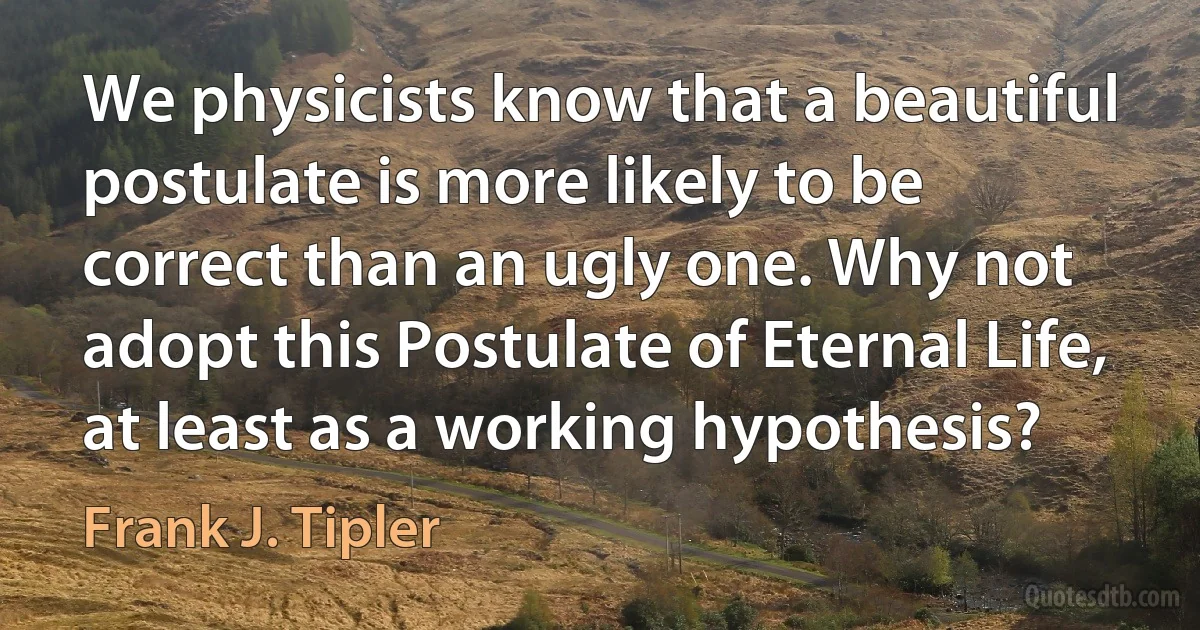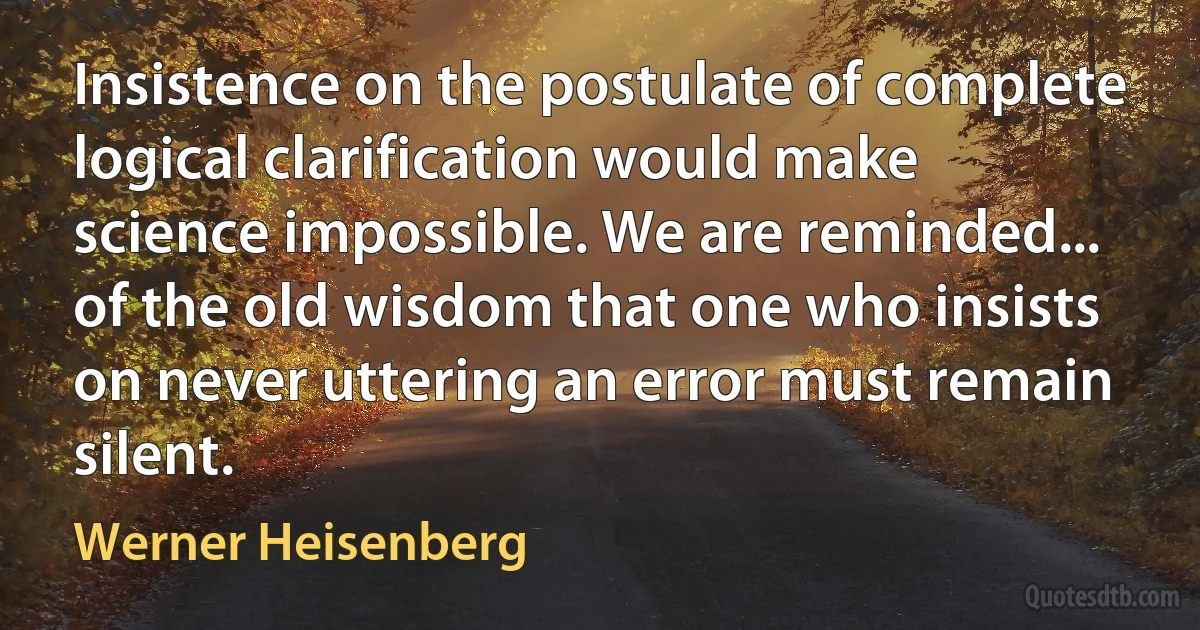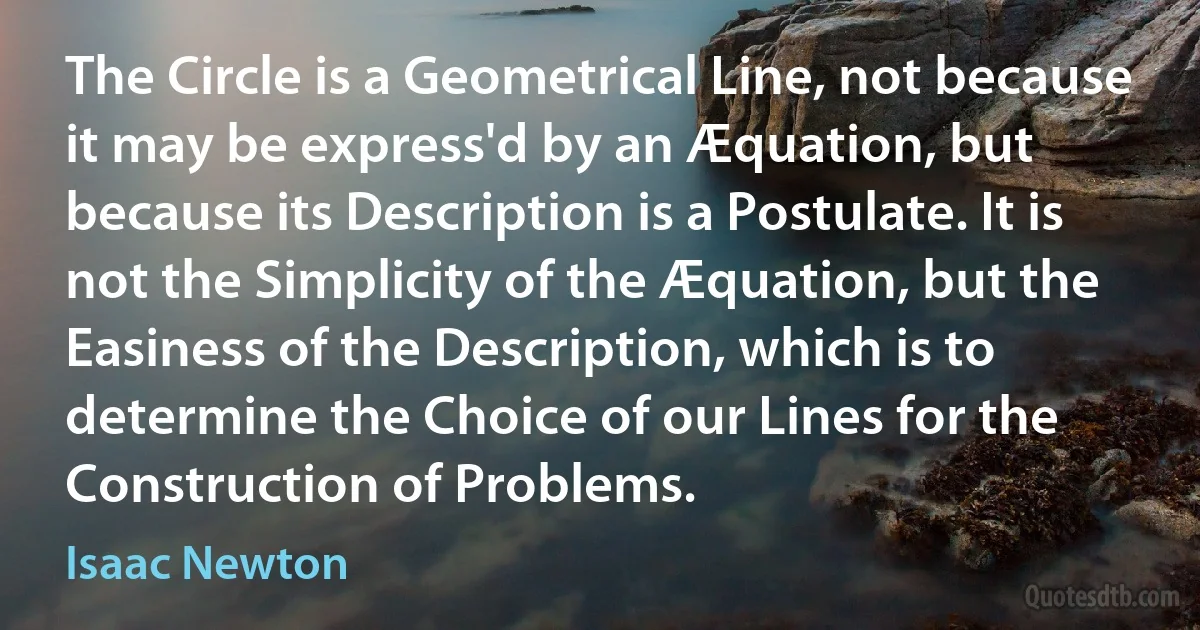Postulate Quotes - page 3
Western philosophy and science have for the most part been committed to the Simplicity Theory of Truth: the simplest theory that accounts for the data is the true theory. (Theories are simplest which postulate the fewest entities, require the fewest hypotheses, generate predictions by the fewest calculations, etc.) ...If someone believes that the world is made for him to have dominion over and he is made to exploit it, he must believe that he and the world are so made that he can, at least in principle, achieve and maintain dominion over everything. But you can't put things to use if you don't know how they work. So he must believe that he can, at least in principle, understand everything. If the world exists for man, it must be usably intelligible, which means it must be simple enough for him to understand. A usable universe is an intelligible universe is a simple universe. ...And so it goes with the philosophy and the science of The Arrogant Eye.

Marilyn Frye
When I have asked thinking men what reason they had to believe that every fact in the universe is precisely determined by law, the first answer has usually been that the proposition is a "presupposition " or postulate of scientific reasoning. Well, if that is the best that can be said for it, the belief is doomed. Suppose it be " postulated " : that does not make it true, nor so much as afford the slightest rational motive for yielding it any credence.

Charles Sanders Peirce
However difficult those simple beginnings may be to accept, they are a whole lot easier to accept than complicated beginnings. Complicated things come into the universe late, as a consequence of slow, gradual, incremental steps. God, if he exists, would have to be a very, very, very complicated thing indeed. So to postulate a God as the beginning of the universe, as the answer to the riddle of the first cause, is to shoot yourself in the conceptual foot because you are immediately postulating something far far more complicated than that which you are trying to explain.

Richard Dawkins
At the center of market fundamentalism lies the general acceptance of the Walrasian general equilibrium model, or the neo-classical paradigm. Although many economists came to doubt the universal validity of such models in view of economies of scope, bounded rationality, asymmetric information, and other types of market imperfections and ventured into institutional analysis, the orthodoxy still remains the one which postulate some type of rationality of atomized individuals and the market which mediate among these atomized individuals and firms to reach some stable equilibrium.

Eisuke Sakakibara
It must be confessed that the new quantum mechanics is far from satisfying the requirements of the layman who seeks to clothe his conceptions in figurative language. Indeed, its originators probably hold that such symbolic representation is inherently impossible. It is earnestly to be hoped that this is not their last word on the subject, and that they may yet be successful in expressing the quantum postulate in picturesque form.

H. Stanley Allen
On principle, there is nothing new in the postulate that in the end exact science should aim at nothing more than the description of what can really be observed. The question is only whether from now on we shall have to refrain from tying description to a clear hypothesis about the real nature of the world. There are many who wish to pronounce such abdication even today. But I believe that this means making things a little too easy for oneself.

Erwin Schrödinger
A law explains a set of observations; a theory explains a set of laws. The quintessential illustration of this jump in level is the way in which Newton's theory of mechanics explained Kepler's law of planetary motion. Basically, a law applies to observed phenomena in one domain (e.g., planetary bodies and their movements), while a theory is intended to unify phenomena in many domains. Thus, Newton's theory of mechanics explained not only Kepler's laws, but also Galileo's findings about the motion of balls rolling down an inclined plane, as well as the pattern of oceanic tides. Unlike laws, theories often postulate unobservable objects as part of their explanatory mechanism. So, for instance, Freud's theory of mind relies upon the unobservable ego, superego, and id, and in modern physics we have theories of elementary particles that postulate various types of quarks, all of which have yet to be observed.

Johannes Kepler



